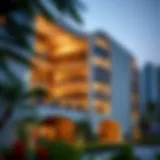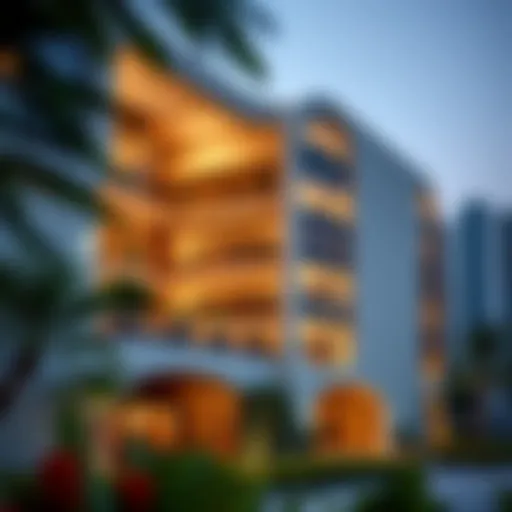Future Trends Transforming Dubai's Real Estate Market
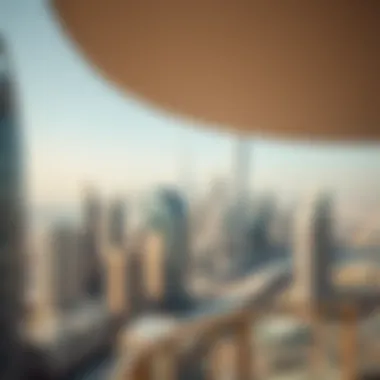

Intro
Dubai has continuously redefined the skyline and ambiance of urban living, making it a hub of opportunity and innovation in the real estate arena. As we look to the future, the landscape of property development in this city promises not just growth, but transformation. Investors, home buyers, and stakeholders alike are keenly tuned into these changes, anticipating how various upcoming projects will reshape not just the city but the entire region. It’s crucial to understand the foundation upon which these developments are built, which ranges from shifting market trends to different types of properties that are on the horizon. This exploration serves to crystallize the expected advancements in Dubai’s vibrant real estate scene, giving insights that are both timely and relevant for various interested parties.
Market Trends
Current Market Analysis
In 2023, Dubai’s real estate market exhibits a mixture of resilience and innovation. Properties have seen a steady increase in demand, particularly as expatriates and investors eye the city’s unique offerings. Recent data indicates that residential sectors, especially those near the waterfront and in metropolitan hubs, are thriving. The luxury segment, in particular, is sizzling, with buyers showing a penchant for opulent villas and premium apartments.
New regulations have encouraged foreign investment, inviting global players to dip their toes into the ever-expanding pool that Dubai offers. This has contributed to a competitive environment where property prices have stabilized, providing a welcoming atmosphere for potential investors.
Key Indicators:
- Increasing foreign investment
- Rising demand for high-end properties
- Steady rental yields attracting long-term investors
- Development of infrastructural projects linking suburbs to central areas
Future Predictions
Looking forward, the real estate market in Dubai is poised for more than just incremental growth; it’s on the cusp of a sizeable leap forward. Industry experts predict that technological advancements will facilitate smart living environments, evident in projects integrating artificial intelligence and sustainability. These smart cities are expected to draw a crowd focused on eco-friendly practices in urban settings.
- Smart Innovations: Integration of IoT in homes, presenting conveniences that cater to the tech-savvy buyer.
- Sustainable Practices: Growth in green buildings, aligning with global shifts towards eco-friendly solutions in construction.
- Diversification of Offerings: From tiny homes to expansive estates, property types are widening in scope to cater to a more diverse clientele.
"Dubai aims to not just be the heart of the Middle East but the blueprint for real estate excellence on a global scale."
Property Types
Residential Properties
The residential real estate segment is evolving rapidly. Envision luxurious high-rise apartments overlooking the sea, vibrant communities that offer amenities beyond just living quarters. There’s a notable rise in developments focusing on mixed-use spaces where living, working, and leisure blend. Developers are also emphasizing community spaces that foster interaction and collaboration among residents.
- Key Residential Developments:
- The Palm Jumeirah—Luxury at its finest.
- Dubai Creek Harbour—A visionary multi-purpose area combines living, retail, and leisure spaces.
- Dubai Marina—Thriving on vibrancy, combining urban living with waterfront relaxation.
Commercial Properties
The commercial property landscape is equally dynamic. As businesses either flourish in Dubai or relocate, demand for office spaces is increasing significantly. There’s a shift towards flexible work environments, meaning co-working spaces are becoming more popular. This trend is driven by a younger workforce that values innovation and collaboration.
- Emerging Trends:
- Developments pushing for green office buildings to achieve energy efficiency.
- Expansion of logistics and warehousing facilities due to e-commerce growth.
- Mixed-use development trends that encourage commerce and residence in one area.
Overview of Dubai's Current Real Estate Landscape
To grasp where Dubai's real estate market is headed, one must first look at its current state. The overview of this market holds immense significance as it lays the groundwork for understanding future prospects. Investors and stakeholders should be equipped with a thorough understanding of what's on offer. The interplay between economic conditions, government policies, and emerging trends all contribute to the existing landscape.
The characteristics of Dubai's vibrant market reflect its unique appeal. It stands out with a blend of opulence and modernity, drawing in both high-net-worth individuals and middle-income families. Properties range from luxury villas in Palm Jumeirah to more affordable apartments across various neighborhoods, catering to a diverse demographic. This mix of options ensures that there's something for everyone, making it a prime target for both domestic and international investors.
Key Characteristics of the Existing Market
- Diverse Offerings: The market features a wide range of property types. From skyscrapers dotting the skyline to serene waterfront developments, Dubai’s real estate meets various lifestyle needs.
- High Demand: Foreign investment fuels local demand, driven by Dubai’s global status as a business hub. Many flock here, expecting high returns on investment.
- Innovative Architecture: Dubai is synonymous with architectural marvels. The Burj Khalifa, for instance, embodies innovation, attracting tourists and investors alike. New developments continue to push boundaries, showcasing modern aesthetics combined with functionality.
- Regulatory Framework: The legal landscape has been shaped to promote transparency in transactions. Initiatives like the Dubai Land Department's online services ease the buying and selling process, bolstering investor confidence.
The existing market also gives insight into economic indicators that point towards sustained growth.
Market Trends and Performance Indicators
Analyzing current trends and performance indicators is crucial for anticipating future movement. Here are key trends:
- Price Fluctuations: Property prices have seen gradual increases, with certain areas like Downtown Dubai and Dubai Marina maintaining a high value. However, shifts in global markets might influence local pricing patterns.
- Rental Markets Adjusting: As more expatriates settle in Dubai, the demand for rental properties has surged. Areas with high amenity value are particularly appealing.
- Sustainable Developments: There’s a noticeable trend towards eco-friendly buildings. Developers are now incorporating sustainable practices, from energy-efficient technologies to green spaces, appealing to environmentally-conscious buyers.
- Technological Integration: Technology's footprint in real estate is broadening. Innovations like virtual tours and AI in property management are enhancing the buyer experience, leading to higher engagement and informed decisions.
"As the market continues to evolve, understanding its current landscape becomes essential not just as a reference point, but as a strategic guide for future investments."
Gleaning insights from these characteristics and trends enables investors and stakeholders to maneuver through the complex fabric of Dubai's property market with greater efficiency. Each element intricately ties into how decisions are made today to shape what tomorrow looks like.
Government Initiatives and Policies
Government initiatives and policies play a pivotal role in shaping the real estate landscape in Dubai. They set the framework for how developments are carried out, influence market dynamics, and can either stimulate or hinder investment flows. With an aim to position Dubai as a global hub for business and tourism, the government has recognized the necessity of proactive policies that not only attract foreign investment but also build sustainable communities. In this ever-evolving market, understanding these initiatives is crucial for investors and stakeholders.
Regulatory Changes Impacting Development
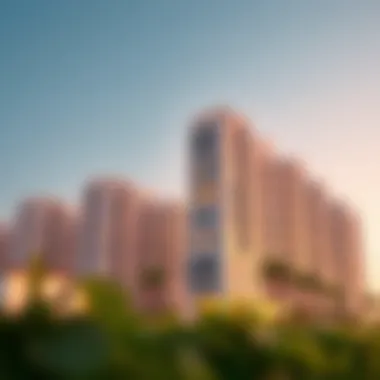

Regulatory changes have a profound influence on the development both in the short and long term. Recently, the Dubai government has implemented a series of reforms aimed at simplifying property transactions and streamlining the approval processes. Such actions include reducing the time taken for obtaining permits and enhancing transparency in dealings. This efficiency not only benefits developers but also builds confidence among potential investors.
Moreover, the introduction of new zoning laws allows for mixed-use developments that integrate residential, commercial, and recreational spaces. This flexibility encourages innovative projects that cater to the changing needs of the population. The aim is to create vibrant communities where people can live, work, and play, rather than being relegated to isolated zones. Investors need to stay updated on these regulations, as they can greatly affect the viability of their projects.
Investment Incentives for Foreign Buyers
The allure of Dubai as a prime destination for real estate investment has been bolstered by various incentives specifically tailored for foreign buyers. Since the introduction of long-term visa programs and property ownership laws that allow expatriates to own property in designated areas, foreign investment has seen significant growth. These initiatives encourage high-net-worth individuals to make Dubai their home or investment base.
In tandem with these measures, the government often announces reduced fees for property transactions to further entice investors. Additionally, marketing strategies that emphasize Dubai's tax advantages, such as zero property tax and no capital gains tax, resonate well with foreign buyers looking for lucrative opportunities.
The identification of specific sectors showing growth—such as hospitality and commercial real estate—further adds to the attractiveness of Dubai as an investment destination. While engaging in the local market, understanding these incentives can pave the way for strategic investments.
"Government policies are the cornerstone of sustainable development in Dubai’s real estate sector. Recognizing their significance can greatly enhance investment strategies."
As Dubai navigates its future, these governmental approaches will be essential in steering its property market towards broader horizons. Investors must remain vigilant and informed, ensuring they seize the myriad opportunities presented by these well-conceived initiatives.
Major Upcoming Projects
The real estate scene in Dubai is buzzing with momentum, and various major upcoming projects hold significant weight in shaping the future landscape of the city. From luxury residences to innovative commercial spaces, these developments promise not only to enhance the architectural beauty of Dubai but also to contribute positively to the economy and community. Investors and potential homeowners alike should pay close attention to these projects as they reveal insights into the evolving preferences and needs of the market.
Residential Developments on the Horizon
Luxury Housing Initiatives
Luxury housing initiatives in Dubai are not just about aesthetics; they reflect a deep understanding of affluent lifestyles. These developments range from breathtaking villas in gated communities to penthouses with views that can make anyone weak at the knees. The draw here is the superior architectural design, world-class amenities, and the prestige that comes with owning such a property.
For instance, developments like the Elysian Mansions offer private beach access and are designed with a focus on wellness—a trend that has become increasingly popular among high-net-worth individuals.
The unique feature of many luxury housing options is the personalization available to buyers. They can often customize their space to a degree unusual in traditional real estate. This can create an emotional connection, making them a beloved choice for buyers looking to invest.
Affordable Housing Projects
On the flip side, affordable housing projects address a critical demographic need. With Dubai’s rapid growth comes the pressing requirement for housing that won’t break the bank. Projects such as Dubai South showcase an innovative approach to urban planning, where affordability and quality do not have to be mutually exclusive.
Affordable housing options stand out through their accessibility to various income groups, offering a sense of community while maintaining quality standards. They often incorporate green spaces and community gardens, providing even more value for residents looking for cost-effective but pleasant living spaces.
Commercial Spaces and Business Hubs
New Office Complexes
The demand for new office complexes in Dubai is on a steady rise as the city positions itself as a global business hub. These spaces are designed with flexibility in mind, accommodating both traditional office setups and co-working environments. With companies pivoting to hybrid work models, developers are prioritizing functionality and connectivity in these new builds.
For example, projects in the Dubai Design District emphasize modern design integrated with high-tech facilities, which can attract startups and established businesses alike.
The real charm of these new office complexes lies in their adaptability; they can easily evolve with changing business dynamics, making them a wise investment for both landlords and tenants.
Retail Developments
In the realm of retail, Dubai continues to expand its footprint with developments like The Dubai Mall extension that aim to blend shopping with entertainment. These projects reflect the changing way consumers engage with retail, leaning towards experiences rather than mere transactions.
What's remarkable is the integration of technology with shopping, where developments include space for augmented reality and interactive displays to enhance the shopping experience. However, the challenge remains in balancing the brick-and-mortar retail with the growing trend of e-commerce.
Infrastructure and Transportation Innovations
Expansions in Public Transit
Dubai’s expansion in public transit is crucial for its long-term sustainability. New projects aim to improve connectivity between key areas of the city, making urban mobility easier for residents and visitors. Initiatives like the Dubai Metro extension illustrate the government's commitment to reducing traffic congestion and promoting public transport.
These expansions are beneficial not just to commuters but also to the real estate market, as improved transit access often leads to increased property values in connected areas.
Development of Smart Road Networks
In tandem with public transport, the development of smart road networks is carving a path for futuristic urban dwelling. Smart roads feature advanced traffic management systems, which can improve safety and efficiency on the roads. Innovations like real-time traffic updates and integrated navigation systems can significantly enhance daily commutes.
Such infrastructures not only improve the quality of living for residents but also add significant value to nearby properties. In the long-term view, these developments can support the increasing population and ensure Dubai remains a desirable place to live and invest.
In summary, the upcoming projects in Dubai's real estate sector highlight the city's commitment to innovation and sustainability, while accommodating the diverse needs of its residents and investors alike.
Technological Advancements Shaping Real Estate


Technological advancements are redefining how real estate functions, particularly in a rapidly evolving market like Dubai. This section sheds light on the importance of technology in shaping the future landscape of real estate and focuses on specific innovations that promise to enhance efficiency and sustainability. From smart home technologies to construction practices that emphasize environmental stewardship, the influence of technology cannot be overstated. Not only do these advancements serve practical purposes, but they also markedly improve the quality of life for residents and investors alike.
Impact of Smart Home Technologies
Smart home technology is starting to feel less like science fiction and more like the new normal in Dubai's real estate market. Home automation systems—such as those provided by Google Nest or Amazon’s Alexa—are becoming standard in new developments. This trend allows for better control over lighting, heating, and even security, giving homeowners a hands-on approach to managing their living spaces. Consider that a simple tap on your phone can control the thermostat or turn off lights in a property that’s still under construction. This level of convenience has wide appeal, especially for investors targeting renters who appreciate modern amenities.
"The integration of smart home features can increase property value and attract a broader demographic of buyers and renters."
Moreover, these technologies contribute to energy efficiency. A smart thermostat, for instance, can significantly reduce energy consumption, easing the costs of utilities. For landlords, this could mean a boost in ROI, while for tenants, lower bills translate into enhanced quality of life.
Sustainable Construction Practices
Sustainable construction practices are becoming essential in Dubai's real estate landscape. With climate change increasingly recognized as a pressing issue, builders are making strides to ensure that new developments prioritize eco-friendliness. Techniques like using renewable energy sources, recycling building materials, and minimizing waste during the construction process are becoming common. The adoption of green certifications such as LEED (Leadership in Energy and Environmental Design) is yet another sign of the industry's shift towards sustainability.
For example, the Dubai Sustainable City project showcases how integrating green initiatives can lead to improved living conditions and reduced environmental impact. Properties here are designed with ecological considerations at their core, targeting lower energy consumption and waste generation. Investors should gear up to see how these practices not only benefit the planet but also cater to a shift in consumer preferences toward eco-friendly living spaces.
Furthermore, innovations such as 3D printing in construction are being experimented with. This method can reduce both time and costs while allowing for more intricate designs that meet contemporary living demands. As these advancements continue to take root, they’re likely to yield significant advantages for developers and buyers, proving that sustainability and technological progression can go hand in hand.
Economic Considerations
Understanding the economic factors at play within Dubai's real estate market is essential for stakeholders seeking to navigate this dynamic landscape. Economic considerations not only dictate property values but also inform investment decisions and consumer behaviors. As Dubai continues to evolve, recognizing these elements will be key in strategizing for both profitability and sustainability.
Forecasting Property Prices
Accurately forecasting property prices in Dubai is a complex task. Various elements influence price trends, including market fluctuations, demographic shifts, and emerging economic policies. Investors must consider how these forces interact to form a comprehensive view of future price movements. For instance, an influx of expatriates and tourists can drive demand for housing, potentially leading to price increases.
Moreover, recent government initiatives aimed at diversifying the economy away from oil reliance can also impact real estate pricing. The introduction of new business districts and commercial developments tends to create more job opportunities, thereby increasing demand for residential properties.
Key factors influencing price forecasting include:
- Changes in government regulations and policies
- Infrastructure developments, such as new transit projects
- Global economic conditions that impact investor sentiment
Collectively, these factors contribute to a more nuanced understanding of property values in Dubai. Recent trends have shown price stabilization in certain sectors, suggesting that market maturity could be on the horizon. However, volatility from global events may still present challenges.
Shifts in Rental Demand
Rental demand in Dubai's real estate market is experiencing noticeable shifts, influenced by various socio-economic factors. With a burgeoning population and an evolving workforce, the appetite for rental properties remains strong. However, the preferences of renters are changing. A significant trend observed has been a growing inclination towards properties that offer flexible leasing terms and are situated in accessible locations.
This shift is exacerbated by the ongoing rise of telecommuting and hybrid work models, leading many renters to prioritize space, comfort, and proximity to essential services. As a result, areas that were once considered suburban or fringe are gaining traction as prospective renters seek affordability without sacrificing quality of life.
Noteworthy trends affecting rental demand include:
- Increased preference for short-term rentals and flexible leasing options
- Growing importance of amenities, such as fitness centers and coworking spaces
- Demand for eco-friendly and energy-efficient housing options
The impact of expatriate communities cannot be ignored either. These populations often have distinct preferences that shape rental demand patterns in various districts. Resultantly, landlords and property managers are tasked with adapting to these changing needs, ensuring their offerings remain competitive in the marketplace.
In summary, economic considerations such as property price forecasting and shifts in rental demand provide critical insights for investors and other stakeholders aiming to thrive in Dubai's evolving real estate scene.
Socio-Cultural Impacts of Development
The socio-cultural dynamics in Dubai are shifting rapidly, driven largely by ambitious developments in the real estate sector. This part of the article sheds light on two main areas: the impact on local communities and the integration of expatriate populations. Understanding these aspects is crucial for investors, home buyers, and property managers, as they affect not only the market trends but also the socio-economic fabric of the city.
Impact on Local Communities
The construction of new residential areas and commercial complexes significantly influences local communities. These advancements often catalyze changes in social interaction, cultural exchange, and economic opportunities within neighborhoods.
- Community Cohesion: With the influx of new residents into communities, there’s a potential rise in diversity, bringing various cultural influences. This mix can lead to local festivals, markets, and community events that enhance the cultural vibrancy of the area.
- Infrastructure Development: New developments typically come with improved infrastructure such as parks, schools, and healthcare facilities. These elements not only enhance the quality of life for residents but also become a major selling point for potential buyers and investors.
- Employment Opportunities: Construction projects create numerous jobs during and after development. Local economies often see a boost as new businesses set up to cater to an increased population, thereby creating a ripple effect of economic activity.
"The heart of Dubai is its people. New projects can shape communities in meaningful ways, creating a livelier, more collaborative environment.”
Overall, while the economic gains from new developments are highly visible, the subtle shifts in cultural dynamics play a powerful role in how communities evolve over time.
Integration of Expatriate Populations
Dubai is often referred to as a melting pot due to its vibrant expatriate community. As new real estate projects roll out, this diverse population continues to grow, shaping the city’s social landscape.
- Cultural Exchange: The integration of expatriates introduces fresh perspectives and ideas, influencing local culture, arts, food, and lifestyle. Local businesses find new ways to cater to varied tastes, fostering an environment of mutual appreciation and understanding.
- Challenges of Integration: Alongside the benefits come challenges such as potential social stratification and cultural clashes. Balancing the needs and expectations of local and expatriate populations requires careful planning and community engagement.
- Long-Term Commitment: Many expatriates view Dubai as a long-term home. The stability brought about by permanent residences can lead to stronger commitments from these individuals towards local community initiatives, schooling systems, and neighborhood relations.
Understanding these dynamics is imperative for stakeholders looking to invest in Dubai’s real estate. As the market develops, so too does the necessity for policies that promote inclusive growth, ensuring that both local and expatriate populations thrive together in harmony.
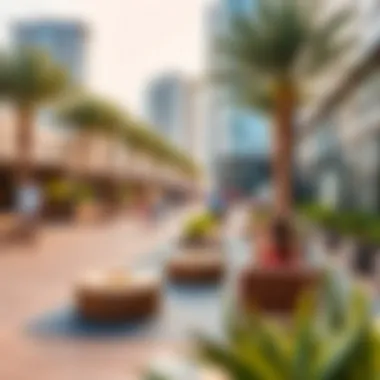

Environmental and Sustainability Issues
The real estate sector in Dubai is at a turning point, where the balance between development and sustainability becomes vital. As a world-renowned destination for business and tourism, the drive for growth must align with ecological responsibility. This discussion doesn't merely hinge on meeting regulatory requirements; it's about incorporating environmentally friendly practices that can elevate the quality of life for both residents and visitors. The integration of sustainable methods can lead to enduring benefits such as reduced operational costs, enhanced property values, and improved public health.
Balancing Growth with Sustainability
The rapid growth of Dubai's skyline is often the subject of awe and admiration. Sleek buildings and extensive complexes reflect its ambition. However, as more developments arise, the pressure on natural resources intensifies. To tackle these challenges, a multifaceted approach is necessary, one that blends economic growth with ecological mindfulness.
Efforts such as incorporating green spaces into property designs can mitigate urban heat and enhance air quality. Additionally, developers can harness renewable energy sources, making their projects not only modern but also sustainable. For instance, using solar panels to power common areas in residential complexes or tech hubs can recapture energy costs over time.
"A house built today needs to be a shelter for the future, addressing not just the needs of its inhabitants today but ensuring the well-being of the environment for generations to come."
The success of this movement hinges on collaboration between property developers, the government, and the community. Education campaigns aimed at potential buyers can elevate awareness about sustainable options available in the market, broadening the appeal of eco-friendly structures.
Future of Green Building Regulations
Dubai authorities acknowledge the accelerated pace of sustainability in real estate. As such, future regulations are shaping up to ensure that new constructions meet higher environmental standards. By 2025, it’s expected that stricter guidelines will enforce energy efficiency, waste management, and the responsible use of materials.
One promising aspect is the focus on green certifications like LEED (Leadership in Energy and Environmental Design), which are likely to gain traction. Properties earning these certifications may not only have lower utility costs but could also benefit from higher market demand. Buyers are increasingly valuing eco-conscious living, making it a powerful selling point for any property.
In addition to governmental initiatives, grassroots movements are pushing for transparency in environmental practices among developers. Homebuyers want assurances about the sustainability of the structures they invest in. Green building regulations can bridge these concerns while promoting a deeper commitment to environmental stewardship.
Ultimately, as regulations tighten and awareness spreads, the path forward for Dubai's real estate will hopefully lead to a harmonious relationship between development and sustainability, creating a vibrant, livable city that appreciates its roots while soaring to new heights.
Investment Opportunities
Investment opportunities in Dubai’s real estate sector hold a prominent place in understanding the future dynamics of the market. As various trends unfold and innovative projects emerge, it becomes crucial to recognize the potential benefits and unique attributes of distinct segments within the property landscape. Being informed about these trends can significantly guide investors, home buyers, and stakeholders in making astute decisions.
Identifying Promising Sectors
The first step in navigating the investment landscape is to identify promising sectors ripe for growth. In the context of Dubai, several areas stand out:
- Luxury Real Estate: High-end properties continue to attract affluent buyers from around the globe. Developments such as the Opera District in downtown and waterfront properties around Jumeirah Beach offer opulent living spaces with unparalleled views.
- Middle-Income Housing: With the influx of expatriates and a growing local population, there is an increasing demand for affordable yet quality housing options. Projects in areas like Dubai South and Dubai Investment Park are catering to this need, balancing quality and affordability.
- Commercial Real Estate: The UAE's proactive approach towards innovation has led to significant growth in commercial spaces. New office complexes in areas such as Business Bay and the Dubai Design District are creating vibrant hubs for entrepreneurship.
- Sustainable Developments: Properties that integrate sustainability into their design and function are gaining traction. Developments that focus on eco-friendly features and technology, such as The Sustainable City, are becoming attractive for environmentally conscious investors.
Risk and Return Analysis
Delving into the financial side of this investment realm necessitates a solid understanding of risk and return analysis. Investments inevitably come with a degree of uncertainty, and assessing these factors can equip stakeholders to make informed choices. Here are key considerations:
- Market Volatility: The real estate market is subject to fluctuations influenced by various factors, including economic trends, government policies, and global events. An awareness and sensitivity to these variables are vital for investors.
- Long-Term vs Short-Term Gains: Real estate is typically seen as a long-term investment. While quick profit opportunities may arise, steady, consistent growth often yields better returns in a dynamic environment like Dubai.
- Location Factors: Properties in prime locations generally have more stability and higher demand. Conducting thorough research on neighborhood trends helps in identifying areas that have the potential for appreciation.
- Regulatory Considerations: Understanding the local laws and regulations affecting real estate investment can mitigate risks. This affects not only property ownership but also rental regulations, taxes, and possible incentives for foreign investors.
“Investing intelligently in Dubai’s real estate means recognizing opportunities in the current environment while being prepared for the challenges that may arise.”
At the end of the day, astute investors recognize that the right opportunities lie in a blend of proactivity, knowledge, and adaptability. By continuously studying emerging sectors and being aware of the broader economic picture, individuals can position themselves for success in Dubai’s ever-evolving real estate landscape.\
For further research, sources like Wikipedia and Britannica can provide additional context on global and local market trends.
Finale
The conclusion serves as a critical juncture in understanding the future developments taking shape in Dubai's real estate scene. It brings together the various threads discussed throughout the article, providing a well-rounded perspective on the landscape. It’s more than a summary; it is an invitation to investors, property managers, and home buyers to think about the implications and opportunities nestled within these future advancements.
Real estate in Dubai is not just about bricks and mortar. It's about enhancing quality of life, fostering economic growth, and integrating sustainability. The upcoming projects herald a new era, where technology meets tradition and luxury intertwines with accessibility. The relevance of the conclusion lies in its focus on the broader picture—how individual developments can serve to fortify the city’s position as a global real estate hub.
In evaluating the benefits of these developments, several factors stand out:
- Economic Resilience: Continuous innovation ensures that the market remains robust, even amidst global uncertainties.
- Cultural Enrichment: Integrating diverse communities and offering various housing options enhances the socio-cultural fabric of the city.
- Sustainability Focus: As sustainability becomes a non-negotiable in global markets, Dubai’s efforts in green building practices position it favorably on the world stage.
The considerations that arise from this overview is not just about what is on the drawing board, but also about what potentials lie ahead for those willing to adapt and engage with the evolving landscape.
Summary of Key Insights
In looking back at the discussion, several key insights emerge:
- Diverse Market Offerings: There’s a notable expansion in both residential and commercial segments, catering to varying demographics and needs.
- Government backing: Supportive regulatory measures and incentives for foreign investment shape a more inviting market.
- Technological integration: Smart building technologies are redefining how real estate is developed and managed.
These insights are critical for potential investors and stakeholders to grasp the nuances that could influence their decisions. The landscape is shaped not only by current trends but also by the anticipated long-term transformations that will reshape Dubai’s identity.
Future Directions for Research
To further enrich the understanding of Dubai's real estate future, several avenues for research can be explored:
- Impact of Global Trends on Local Market: Investigating how shifting international economic climates affect local real estate demand.
- Socio-Economic Affects: A closer look at how new developments alter community dynamics and local economies could provide deeper insights.
- Sustainability Practices: Further research into innovative sustainable construction techniques may reveal new avenues for growth and investment.
By delving into these aspects, stakeholders can arm themselves with knowledge that transcends mere observation, facilitating strategic planning and investment decisions that align with the future of Dubai’s real estate landscape. Exploring these areas will not only contribute to a richer narrative but will also elevate the discourse surrounding this vibrant market.
"As Dubai continues to innovate, the real estate sector remains a focal point for both economic growth and sustainable living. With every development, there is a story waiting to unfold."
For more in-depth information, you might consider checking out resources like Encyclopedia Britannica, and studies from leading real estate institutions or governmental bodies such as Dubai Land Department.




